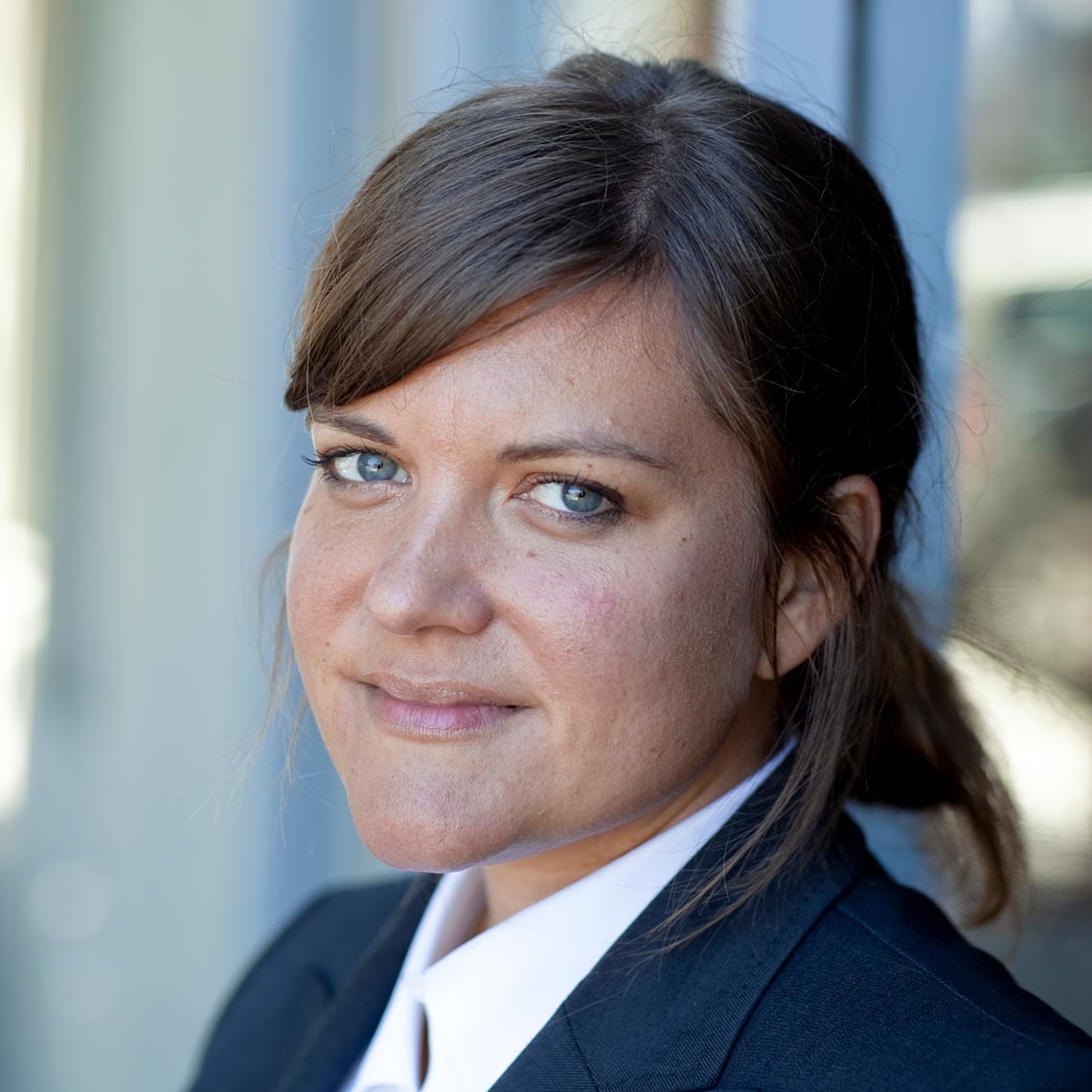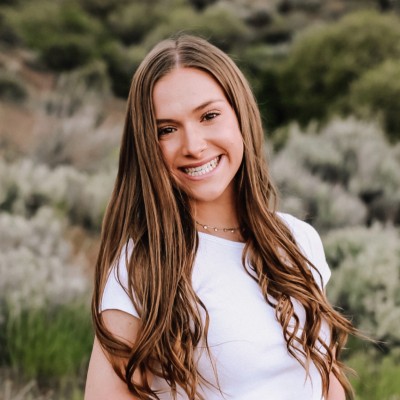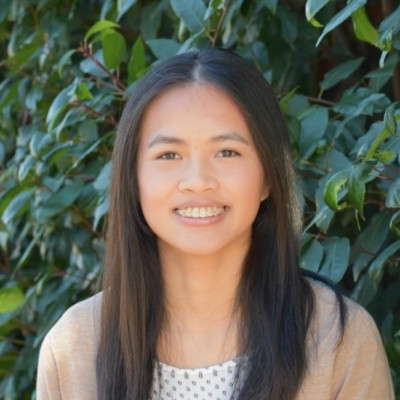Grand Challengers
Emily Cox Pahnke’s award-winning course equips and inspires students to tackle society’s colossal conundrums by thinking like an entrepreneur
Can $5 change the world?
Not much—at least, in most cases.
But an innovative class at the UW Foster School of Business called Grand Challenges for Entrepreneurs is not most cases. This recipient of The Aspen Institute’s “Ideas Worth Teaching” award is designed to equip and inspire students to approach society’s biggest challenges—climate change, global health, poverty, crime, racial injustice, homelessness, opioid addiction—with an entrepreneurial mindset.
This curricular experiment begins small, on day one, with an exercise called “Creativity Under Constraint.” In it, course creator Emily Cox Pahnke gathers her students into small teams, seeds each with $5 and gives them two hours in which to “create value,” however they define it.
As investment, that fiver is miniscule. As inspiration, it’s massive.

Past students have leveraged their limited resources toward all kinds of greater goods. They have established matching funds to purchase vaccines in Africa. Targeted social media ads to educate young women on little-known safety features of the iPhone. Launched Instagram campaigns to increase mental health awareness and decrease the spread of COVID-19. Cast a viral fundraiser to buy meals for famine-struck Indonesians.
“There are so many problems in the world, and a lot of people are feeling overwhelmed. This can lead to a kind of paralysis,” says Pahnke, the Lawrence P. Hughes Endowed Professor of Innovation and Entrepreneurship at Foster. “This exercise—inspired by the creativity challenge of my Stanford mentor Tina Seelig—is meant to teach my students that they don’t need to try to do everything right away. Small acts can make a difference. You can do a lot with a little.
“And they’ve found some clever ways of magnifying their impact quickly.”
Importing experts
Practicing creativity under constraint sets the foundation for more boundless impact ahead. Over the rest of the course, Pahnke imparts tools to better understand the big problems the world faces—and to identify, design and implement effective solutions.
She works grand challenge by grand challenge, from homelessness to energy to food and water to environment to global health to medical innovation. Each topic is introduced by the words of an eclectic list of great thinkers and doers that ranges from Frederick Douglass to Greta Thunberg, Thomas Jefferson to Margaret Chan, Mary Oliver to Guy Kawasaki, Dr. Paul Farmer to Dr. Seuss.
Unless someone like you cares a whole awful lot, nothing is going to get better. It’s not.
At each topic, Pahnke leads a deep dive into one or more living case studies that demonstrate an out-of-the-box way of addressing a problem, be it locally or globally.
In addition to reading about and discussing these inventive initiatives, students also get to meet most of their creators—in person or via teleconference.
The most recent cast of guest speakers included Doniece Sandoval, the founder of LavaMae, an organization that turned retired transit buses into mobile shower facilities for unhoused people across California. Greg Robinson and Ed McKenzie, the founders of Seattle-based Drift, discussed their company that powers businesses with 100% renewable energy. Gates Foundation veteran Saara Romu (MBA 2007) spoke on solutions big and small in global health. Jeffery Roh (MBA 2016), the founder of IntuitiveX, discussed life-saving innovations in medicine. Madison Holbrook (MS 2018), the co-founder of Meal Matchup, touched on her organization’s human centered design approach to delivering unused food to those in need.
Another featured guest was Dr. Paul Cox, the founder of a global organization called Seacology that helps island communities preserve their cultures and their ancestral forests and seas. He’s also the inspiration behind the course.
Runs in the family
Cox happens to be the father of Emily Cox Pahnke. A globe-trotting ethnobotanist, his field studies took his family around the world during Pahnke’s childhood. At several points, the family lived on Savai’i, a remote island in the South Pacific that is part of Samoa.

Cox became concerned by the rapid deforestation around Falealupo, the village that hosted his family. In order to afford a quality school for its children, village leaders had been forced into a devil’s bargain with loggers for the rights to harvest the surrounding 30,000 acres of pristine rainforest that their people had conserved for ages.
Earning the trust of his adopted neighbors, Cox raised money—initially mortgaging his family’s home—to enable Falealupo to retain its ancestral forests and provide a great education for its children.
A more sustainably funded version of this model became the blueprint for Seacology, an organization that protects the habitats and cultures of island people around the world.
Rubber meets road
The formative experience in Samoa made a big impression on Pahnke, who has become a conduit of her father’s inspiration. She designed ENTRE 372 to serve as an introduction to entrepreneurship for students at the Foster School and around the UW. But it’s version of entrepreneurship carries a distinct social purpose.
“The energetic and experiential pedagogy (of the course),” noted Jaime Bettcher of The Aspen Institute, “encourages creativity and uses challenges that students see in their daily lives to imbue students with a sense of agency to create the world they envision.”
What is it you plan to do with your one wild and precious life?
To overcome that endemic feeling of paralysis, Pahnke crafts assignments that ask students to embrace the ambiguity inherent in grand challenges.
In addition to exercising creativity under constraint, they tackle a term project that homes in on a specific group or area dealing with a challenge. “Narrowing their focus allows my students to get closer to the problems and to gain empathy for people dealing with them,” Pahnke says. “This, in turn, helps them to design more effective solutions.”

The culminating “Personal Grand Challenge” tasks students with mapping out how they can become professionals capable of affecting the changes they’d like to see in the world. “It’s an opportunity for students to reflect on how to get the most out of their education and work experiences, and maximize their impact sooner,” says Pahnke, “rather than connecting the dots later in life.”
For instance, Rebecca Wait, a junior majoring in political economy (and moved by the class to add a business minor), and Maddie Dufault, a junior studying management at Foster, used the capstone project to launch a UW chapter of the nonprofit End Overdose, which trains students to administer Narcan in opioid emergencies.
“This class changed the way I view the world,” Wait says. “It made me realized how many grand challenges there really are and how you can be as involved as you want to be in any of them. The most useful life lesson I learned is that people who want to be involved in something and want to change it, will.”
Urgency and agency
That’s precisely the sense of urgency and agency that Pahnke strives to instill.
“It’s important to develop expertise and passion and depth of knowledge,” she says. “But there’s also a lot of value in doing something. I hope my students don’t wait until they feel they have the resources and experience and time to begin tackling problems they care about, because circumstances will never be ideal.”

That message was also received by Christine Nguyen (BS 2022), who took Grand Challenges for Entrepreneurs last year to enhance her studies in public and global health. She says the experience motivated her to make positive change both in and out of her career.
“ENTRE 372 changed the way I view social issues and the solutions that can be taken to solve them,” says Nguyen, who joined Slalom Consulting after graduating in June. “Often times, we think we need one solution to solve it all—and feel that it’s all or nothing. This course showed me how combining multiple small solutions can be more realistic, timely and impactful.”
The way to get started is to quit talking and begin doing.
She adds: “I definitely feel more empowered to push change in my own community after seeing so many individuals creating positive change in their time at the UW and in their careers.”
That’s music to Pahnke’s ears. A lover of stirring quotes, she often presents her students with one more classic, often attributed to Teddy Roosevelt: “Do what you can, with what you have, where you are.”
To her class, she adds an addendum: “Start now!”
